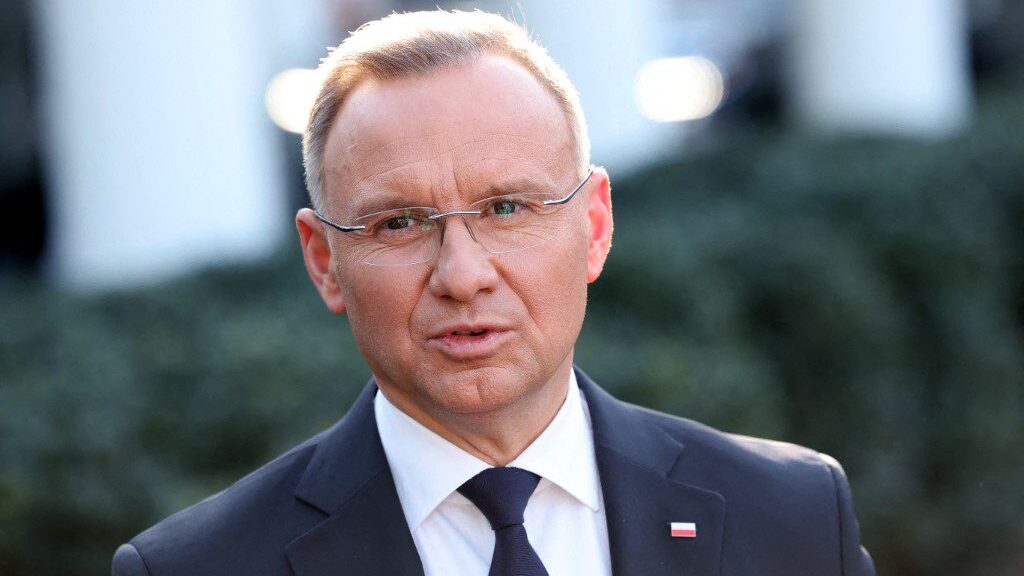
Polish President Andrzej Duda speaks to members of the media following a meeting with U.S. President Joe Biden at the White House on March 12, 2024 in Washington, DC.
Poland is ready to host American nuclear weapons on its territory and has been in talks with Washington about the deployment for some time now, President Andrzej Duda confirmed in an interview with the Polish daily Fakt, published on Monday, April 22nd.
After discussing the president’s recent trip to the U.S. and the importance of NATO’s collective deterrence in preventing war with Russia, the interviewer asked Duda whether Poland’s possible participation in NATO’s Nuclear Sharing Program—an arrangement that lets non-nuclear members host U.S. nukes—was on the table in Washington.
“[Hosting nuclear weapons in Poland] is the subject of Polish-American talks for some time,” Duda confirmed, citing concerns about ongoing Russian militarization in the region. “I must admit that when asked about it, I reported our readiness,” he said.
If it were such a decision of our allies to deploy nuclear weapons as part of nuclear sharing also on our territory to strengthen the security of NATO’s eastern flank, we are ready for it.
According to Duda, Poland needs to update its deterrence capabilities because Russia is also doing the same, just across the borders both to the north and the east. Russia is increasingly militarizing the Kaliningrad district (which has already been equipped with nuclear-capable missiles since at least 2018) and has recently begun redeploying some of its arsenal in neighboring Belarus.
Although not officially confirmed, it is public knowledge that five non-nuclear NATO members (Germany, Italy, Belgium, Netherlands, and Turkey) are already participating in the Nuclear Sharing Program and hosting U.S. nuclear weapons on their territory. If given the green light, Poland would become the sixth and the closest nuclear-equipped NATO country to Russia.
The president believes the key to de-escalation is deterrence, Cold War-style. “It was ‘cold’ precisely because both the West and the Soviet Union were full of missiles,” Duda said in the interview. “Because everyone saw that these missiles were on both sides, no one dared to attack anyone.”
The fact that the decades-long effort of joint nuclear disarmament after the near-catastrophic Cuban Missile Crisis was one of the primary achievements of the period seems to have escaped Duda.
Nonetheless, his comments elicited mixed responses from Polish parties. The conservative PiS and the right-wing populist Confederation are generally supportive of the idea, while Donald Tusk’s liberal governing party, the Civic Coalition remains more skeptical.
Incidentally, Hungarian Prime Minister Viktor Orbán—one of PiS’ closest allies in every question except the war—has just days ago talked about how Europe is switching to “war mentality” and preparing for conflict instead of working for peace, which in itself might lead to escalation.
“I see preparations for war from everyone and from all sides,” PM Orbán said on Friday while launching his party’s EU election campaign. “We are one step away from the West sending troops to Ukraine. This is a vortex of war that could drag Europe down into the depths. Brussels is playing with fire. What it is doing is tempting God.”
In fact, Hungary’s official pro-peace position—saying that instead of endless financial and military support, Brussels should pursue ceasefire negotiations in the conflict—is shared by a plurality of Europeans (41%), as opposed to less than a third who stands by the EU’s mainstream strategy of indefinite support.
Deploying nuclear weapons to Poland would go one step further and would likely be seen as a major escalation by Moscow. Whether the gambit of deterrence would work, however, might not be clear until it’s too late.
